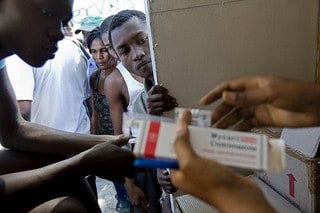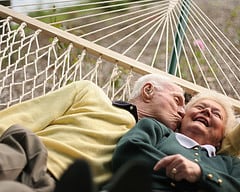As a religious person in the field of global health, I both smile and cringe at the number of my religious friends who have taken an interest in global health. If my Facebook newsfeed is any indication, international medical mission trips are the new weekend retreat. Maybe it’s because there is a new generation of socially conscious believers. Or maybe trips that would once have been explicitly proselytizing are made more socially acceptable with a medical component. Whatever the reason for this deeper affection, we need to DTR before it goes too far.1 I am all for people spending their time in the service of others, but we should understand that it takes more than good intentions to effect real and lasting change.
***
Before we jump too far into this conversation, we have to set the table.
First, let’s establish that the problems mission trips try to address deserve real attention. Yes, there has been great progress in global health status: infant mortality is dropping, AIDS deaths are declining as more people get access to drugs, and polio is once again on the defense. But low-income countries still face serious challenges. There are too few trained professionals, the infrastructure is often weak, many places are acquiring chronic diseases more typical of high-income countries before they eliminate the communicable diseases that plague poorer nations, and the per capita spending on health is too low to solve these problems.
Second, let’s assume that the desire of medical mission trips are good. When we see or hear about someone in need and we respond to meet that need, it is based on a good instinct. Of course there are those who participate to pad a résumé or as a ‘volun-tourist’, but the growth in medical missions is coming out of an essentially good place.
Third, there are many types of short-term medical missions: emergency relief, surgical and dental brigades, and mobile clinics, which are the most common. Emergency relief is fairly obvious. Surgical and dental brigades provide highly specialized care. My comments are also not directed organizations that set up a long-term presence in a single location. My concern is mostly with the ubiquitous mobile clinic, which is when doctors and nurses set up shop for a short period of time and provide basic care that relies mostly on physical exams. The other types are not without challenges, but they would require a separate analysis than the one provided here.
Finally, let’s leave aside the question of who is responsible for the health needs. Some claim that a medical mission from the United States is like an arsonist saving people from the fire he set ablaze. Others hold that corrupt governments and geographical circumstances are more to blame for persistent global health disparities. Regardless of who has the lion’s share of responsibility, there is great need and there are individuals in the United States and elsewhere wanting to respond.
For some people, this might be enough: there is a need: there are people who can and want to respond to that need. Full stop. But isn’t that too low a bar for either medical or moral evaluation?
***
As we look to the future, we can’t ignore the challenges we’ve had along the way. Many deeper problems can arise with these trips that simply go unnoticed by the volunteers because they go as quickly as they came.
First, local health workers can be relegated to second-class professionals. They may not have the formal training that volunteers have, but it weakens rather than strengthens the long-term health of a community when all the hope for health is placed in providers who come and go, or may not ever return.
Second, suggested treatments can be inappropriate for the setting where care is provided. I have seen teams give one month of expensive hypertension medication to patients with high blood pressure. I have seen teams give pap smears with no plan for follow-up. I have seen visitors give nutrition recommendations to diabetes patients who can barely afford to put any food on their table. And on and on.
Third, student volunteers can get excited because they might get to perform medical care that would be illegal for them to do in the United States. For example, my undergraduate students have been asked if they wanted to put in stitches, drain an abscess, and make a surgical incision. For now we depend on one’s conscience (or a strong-willed local health worker) to regulate behavior abroad, but untrained enthusiasts can get caught up in the excitement of providing care without fully considering the implications of their actions.
Fourth, short-timers only have a small glimpse into people’s lives. They might feel good about giving a bottle of vitamins to someone, but don’t see a hungry child get sick from eating them all at once. They are excited to give medication for arthritis, but don’t see the terrible complications that arise when the patient goes to the black market when her donated drug supply runs out. An extensive literature review revealed that there is little evidence that mobile clinics actually improve the long-term health of a community.
Fifth, we rarely consider whether these trips are the best use of limited resources. Very conservative estimates suggest the US spends $250 million on these trips. Given the challenge of collecting the data, I suspect it is far greater. That’s still not a huge amount of money if you consider that just one disease, polio, consumes $1 billion annually for its eradication efforts. But if we take it to a smaller scale, a team of 20 who spend $2000 each to travel on a short-term mission must consider whether $40,000 could be better spent to improve the health of the community.
The list could go on.
At this point you are probably ready to cue up Debbie Downer. But it’s not all bad. Believe it or not, I have been on several of these trips, I take students on them, and I will continue to do so. I just don’t believe they are unassailably good in the way we make them out to be. We would be well served by a more honest assessment of what we are actually doing.
***
So why do I think there’s hope for this relationship? Here’s the deal: short-term medical missions are often more for the people going on them than they are for the people they are going to serve. No, it’s not really either/or – they often help people with serious acute conditions; they generate valuable attention to global health disparities; the personal care communicates to the poor that they are not invisible. But the benefits for the volunteers are deep and extensive.
First, it is an opportunity for conversion. The first time I saw the depths of poverty in a developing country changed the way I looked at the world. And that moment has had staying power. This “conversion factor” is the primary reason I continue to encourage students to go on these trips. For those who have eyes to see, it is an experience that can change your life.
Second, there are areas for intellectual growth that parallel the potential for personal transformation. These trips crystallize the linkages between poverty and health, the importance of culture for health interventions, the challenge of health education, and much more. The secret is that you don’t need to travel abroad to find opportunities for this kind of learning, but there is something about stepping completely outside your own context, and even comfort zone that puts these ideas in starker relief.
Third, there is an opportunity for growth in humility. For me it comes across most clearly in my lack of fluency in the native language. But it might be a discomfort with living conditions or it might be the realization that you can’t have as big of an impact as you thought you could. The point is that these trips take a little bit of control out of our lives and more fully realizing our creaturehood is a good and holy thing.
***
A common claim is, “something is better than nothing.” “If we weren’t there,” the thought goes, “they wouldn’t receive anything, so whatever we can do is good.” First, something is not necessarily always better than nothing from an empirical health impact assessment. But more importantly, this ethical minimalism is simply not befitting any humanitarian organization, much less a religious one.
There are always plenty of anecdotes about that one person whose life was saved because of a trip. Anecdotes powerfully shape our imagination and there are certainly some ethicists who would defend a trip solely based on a single life saved. But medical missions don’t say their objective is to save that one life. They use that one story to imply the larger narrative that they are saving lives.
There is hope for improving these trips. The first step is putting our finger on the truth that these trips often benefit the volunteers much more than they improve the long-term health of the communities they visit. The truth can be hard, especially for those of us in religious circles who are taught that doing for others is good and doing for ourselves is bad. The second step is modifying the trips so they maximize what they do well and minimize any potential damage.2
No doubt some very committed people will take exception to my assessment. Regardless of one’s position, I think there is just too little reflection and discussion on what we are actually doing. My thought is if we don’t challenge the way things are done, we not only allow volunteers to falsely believe they are improving a community’s health, but also allow local health systems to be compromised: lose-lose. If we do challenge it, we not only help volunteers to embrace what they do well rather than what they do poorly, but also modify short-term trips so they build local capacity and improve long-term health: win-win.
As connectivity, travel, awareness, and interest in global health continue to rise we have a choice of getting this right or pretending we are already there. It would be easier just to keep hanging out and pretend that we don’t know where this is going. The “problem” with DTRing is that it places clear expectations on the relationship. There’s room for failure and disappointment. But there’s also potential for growth and fulfillment. At this point, we owe it ourselves and everyone else to take the plunge.
– — – — –


